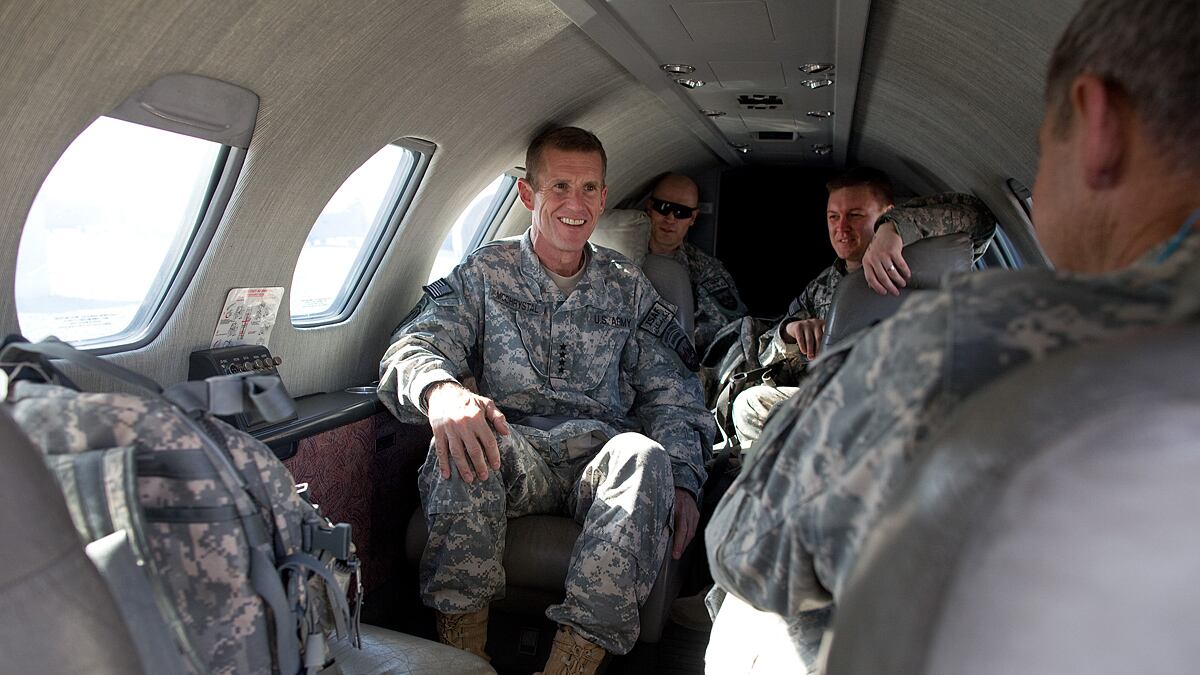It’s impossible to read The Operators, Michael Hastings’s new book about the Afghanistan War, without contemplating the amount of adoration and contempt it is going to generate in the coming weeks. It’s a polarizing book about a polarizing war for a polarized nation. Despite that, it demands to be read by both audiences and everyone in between. Its origins reside in “The Runaway General,” Hastings’s 2010 Rolling Stone article about Gen. Stanley McChrystal and his inner circle, which led to the general’s very public resignation from the top position in Afghanistan. Like it or not, this is a book of great consequence, not a pop-culture puff piece, which some of its deriders claim it is. The Operators seems destined to join the pantheon of the best of GWOT literature, not just for its rock-and-roll details, but for its piercing chronicles of a world gone mad.
Though The Operators covers much more than Hastings’s drunken tour through Europe with “Team America,” that remains the heart of the narrative. Understandably so. Unlike in “The Runaway General,” Hastings identifies the sources of the lightning-rod quotes, from Joe “Bite Me” Biden (Jake McFerren, McChrystal’s longtime friend from West Point and top political adviser) to “We co-opted the media on [Iraq] … You could see it coming. There were a lot of us who didn’t think Iraq was a good idea.” (McChrystal himself.)
One of the overarching themes of The Operators is the growing military-civilian divide in an era of an all-volunteer force. Typically, writers and journalists explore this divide at the ground level, where returning veterans and the society that produced them struggle to reconcile. As wrenching as those stories may be, Hastings has higher aspirations—right at the top, where a new general’s team and a new president’s team vie for influence and only seem to find misunderstanding and distrust.
“The guilt that many felt for not serving was covered up by an uncritical attitude toward those who did,” writes Hastings, both about the disconnect at the highest levels of power and what he coins the media-military industrial complex. As embarrassing as some scenes are for McChrystal and his subordinates, it’s really some of Hastings’s comrades in journalism (I couldn’t help but think of Thomas Friedman’s infamous “Suck on this” clip) whom he most takes to task, lambasting their lack of critical thinking and hard questions in exchange for continued access to the movers and shakers of the war effort.

Loose lips, too much beer, and a cloud of volcanic ash swirl together in a perfect storm of circumstance too strange for fiction. The lack of outright protest by McChrystal and his team in the aftermath of the article’s publication seems understandable now, given the lengths to which Hastings goes to defend his credibility here. Indeed, “he did have that ******* tape recorder running all the time.”
And yet the question of why is not found in these pages, nor can it be. Why would McChrystal and his advisers give Hastings such access? Anyone who’s ever complained about a boss can’t be surprised about what was said—but that it was said in front of a reporter, a reporter from Rolling Stone no less, defies logic. Their subsequent claims that there was a “gentlemen’s agreement” or that he “represented himself as a supporter of the Afghan War” seem flimsy—Rolling Stone’s political leanings are hardly unknown, and neither was Hastings, given that he had already written a book in 2008 often critical of Iraq War policy. This is an era when public-affairs officers grade journalists on a green-yellow-red stoplight of affability; it’s hard to believe that Hastings wouldn’t have registered a crisp orange ahead of the embed.
Hastings is to be commended for the transparency of his own views in this book—he pursues facts and understanding, but doesn’t feign neutrality. At times though, his writing becomes claustrophobic, due to the fervor of his opinions. Just as he did in “The Runaway General,” Hastings overextends himself when criticizing military strategy. For example, his open hostility toward counterinsurgency (not just in Afghanistan, but in the most sweeping, generalized terms) is just as overzealous as the proponents of it whom he castigates, conveniently ignoring historical examples of counterinsurgency campaigns that were successful. Luckily, for the sake of both readers and The Operators, Hastings limits his strategic pontificating to focus on front-line reporting, whether in the den of a four-star general’s staff or the faraway, grimy outposts of an infantry platoon.
From Paris to Kandahar to D.C., Hastings meticulously maps out just how we got to the “beginning of the beginning of the end” of the Afghanistan War. There’s also an interlude in Dubai that rates as the very best of the writing to be found in The Operators; by tracing the haunting history of the American war correspondent in a drunken haze, Hastings captures all the ugly ambiguities of combat to include its raw, visceral thrill.

This book also leads to crippling bouts of introspection. It did for me, at least. As a young veteran, how do I view civilians who haven’t served? After all the hemming and hawing and standard qualifiers, do I really think that service members and vets are somehow better citizens because of their experiences? The answer The Operators forced me to confront is yes, though such a comprehension is laced with unsettling embarrassment. And while that may be understandable and even reasonable in this bizarre era of 1 percent war fighters, it’s not a healthy mindset for our republic, at any level, be it at my lowly one or a commanding general’s.
The answer to the aforementioned question of why does not exist in the pages of The Operators, so it’s hard not to think of the litany of conspiracy theories that emerged from the wreckage of “The Runaway General.” One outrageous theory, something I’ve heard from both those in uniform and out of it, suggests that McChrystal and his gurus, feeling betrayed by Gen. David Petraeus and others and boxed in, wanted out of the quagmire of Afghanistan and decided to go as rock and roll as possible. I personally don’t (can’t) believe it—McChrystal’s love for service and the combat-arms profession shines through in any profile of him, including The Operators—but conspiracy theories can help explain the unexplainable, even when outlandish. We now know part of that story. We’ll have to wait for McChrystal’s memoir—forthcoming later this year, ironically also from a Penguin imprint—for his side of it.




